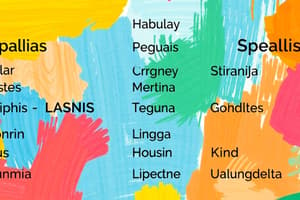Podcast
Questions and Answers
What does the verb 'advertir' mean in English?
What does the verb 'advertir' mean in English?
'Advertir' means to advise or to warn.
Explain the significance of the term 'ajeno' in social contexts.
Explain the significance of the term 'ajeno' in social contexts.
'Ajeno' refers to things belonging to someone else, highlighting ownership and social boundaries.
How is the concept of 'burlarse de' important in understanding humor in language?
How is the concept of 'burlarse de' important in understanding humor in language?
'Burlarse de' means to make fun of, which is crucial for grasping the nuances of humor in conversations.
What does 'en cuanto a' imply in a discussion?
What does 'en cuanto a' imply in a discussion?
Describe the meaning of 'destacar' and its role in communication.
Describe the meaning of 'destacar' and its role in communication.
Flashcards are hidden until you start studying
Study Notes
Vocabulary Definitions
- acaso: Indicates uncertainty, translates to "perhaps" or "maybe".
- advertir: Means "to advise" or "to warn", often used in providing caution.
- afrontar: Translates to "to face up to", suggesting a confrontation or challenge.
- ajeno: Refers to something "belonging to somebody else", indicating ownership.
- albergar: Means "to house", typically in the context of providing shelter.
- alcanzar: Translates to "to reach" or "to attain", often associated with goals or limits.
- ampliar: Means "to widen", crucial in discussions about expansion.
- apenas: Conveys "hardly" or "scarcely", highlighting a limited amount or degree.
- apetecer: Translates to "to take a fancy" or "to feel like", often concerning one's desires.
- aprovechar: Means "to profit" or "to take advantage", used in contexts of benefit.
- asombrar(se): Indicates "to be amazed", often related to surprise or wonder.
- atravesar: Means "to cross" or "to go through", referring to movement across boundaries or obstacles.
- atrever(se) a: Translates to "to dare (to)", emphasizing courage or risk-taking.
- basar en: Indicates "to be based on", pivotal in discussing foundations or origins.
- bastar: Means "to be enough" or "to suffice," relating to sufficiency.
- la bondad: Refers to "goodness", often linked to positive moral qualities.
- burlarse de: Means "to make fun of", typically denoting mockery or ridicule.
- la clave: Translates to "key", representing importance or a solution.
- el colono: Refers to a "settler", someone who establishes residence in a new area.
- conservador: Means "conservative", often in political or social contexts.
- conveniente: Translates to "useful", suggesting practicality or suitability.
- la crítica: Refers to "criticism" or "censure", often related to feedback or judgment.
- cualquiera: Means "any" or "anybody", implying lack of specificity.
- en cuanto a: Translates to "as for", used to introduce a specific topic or aspect.
- conllevar: Means "to bring with", referring to consequences or outcomes.
- los demás: Translates to "the others" or "the rest", indicating a group apart from the speaker.
- el desfile: Refers to a "parade", particularly in a festive or ceremonial context.
- los desperdicios: Means "waste (products)", referring to discarded materials.
- destacar: Translates to "to stand out", often related to exceptional qualities.
- la deuda: Refers to "debt", indicating an obligation to pay.
- disponible: Means "available", stressing accessibility.
- dispuesto: Translates to "disposed", "ready", "fit", or "willing", indicating readiness or willingness.
Studying That Suits You
Use AI to generate personalized quizzes and flashcards to suit your learning preferences.




